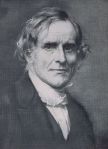The media likes simple analogies. That’s why when (rarely) the question of Michele Bachmann’s religious beliefs comes up, they immediately think Kennedy 1960–the Catholic thing. Soon they will have the voting public believing that Michele Bachmann believes the same thing about religion and political life as JFK did: that they are oil and water, and must be kept strictly apart, as the Constitution decrees. For her part, Bachmann doesn’t care what you believe as long as you don’t look too closely and permit her to win.
But she doesn’t believe in the wall of separation. Nope, not even a lace curtain.
Michele Bachmann believes that faith is a key element in politicial decision-making: “I became a Christian when I was 16 years old,” she says. “I gave my heart to Jesus Christ. Since that time, I’ve been a person of prayer. And so when I pray, I pray believing that God will speak to me and give me an answer to that prayer.”
To be clear, we have moved in fifty years from Kennedy’s belief that religious faith should not be an impediment to holding elective office to Bachmann’s eerily commonplace view that strong, active and directive religious faith is an indispensable virtue in elected officials.
In addition to being a staunch defender of such evanglical idiocies as creation science and the hoax-theory of global warming, she has also heard voices: “That’s what a calling is — if I pray, a calling means that I feel like I have a sense from God. … It means that I have a sense of assurance about the direction I think that God is speaking into my heart that I should go.”
Bill Prendergast has called Bachmann a “stealth evangelical”– dangerous precisely because she is pretending to be something else, anything else. There is a word for this tactic: it’s called dissimulation, but because it is five syllables it’s above the SAT-level of most media analysts and probably won’t be used much.
Instead Bachmann will continue to deflect the more superficial charges of her “flakiness” when the real issue–the real challenge to her constitutional suitability–is her explicit denial of the purport of the First Amendment.
This is a woman who asks for Americanism tests for members of government, but like so many religious nutters has no idea that the Constitution was designed to protect the civil body politic from religious zealots like her.
She is already perfecting the shill: How can I be a flake when I have “a postdoctorate degree” from William and Mary in federal tax law. (Translation: She has a degree beyond her basic law degree from Oral Roberts University, where she was a member of the final graduating class of its failed law school. It got her a job with the IRS. A cursory check of the William and Mary site shows that the LL.M. degree is no longer offered, except to foreign students.)
Her only other education is from Winona State University. Except for her gig with the IRS, she has never practiced law. Whatever the case about her meager accomplishments outside the church, get ready to hear a lot about her “postdoctorate” in the coming months. It’s her surest protection against the charge that she is a screaming fundamentalist loon with no education–a virtue she shares with sibling loonies like Sarah Palin, her rival for the Bible Knowledge award.
Bachmann and her husband Marcus, whom she met at WSU in the Christian Intervarsity Fellowship, run a Christian counseling service in Stillwater, Minnesota. She is a vicious opponent of abortion rights and symbolizes her right to life philosophy by being the foster parent of 23 children. For a decade, her home has been recognized as a “treatment house.”
Since 1988, when she became infatuated with the Christian exceptionalist theology of Francis Schaeffer, she has prayed outside clinics and provided counseling to girls and women seeking to end their pregnancies.
Prendergast writes that Bachmann’s threat is a life or death battle for American democracy. I agree. Some of us believe that this battle may already be lost in the faith-sodden atmosphere of this perishing republic. But insofar as some threats are more worthy of attention and response than others, consider this:
“It’s great to be a ‘stealth evangelical political movement politician’ when it comes to media news coverage. The state’s political media must help you out there by downplaying your ties to politicized religion, because if the voters at large pigeon-hole you as a Dobson puppet, you’d never get elected to anything. …If [Bachmann] ran openly as a candidate of the Christian conservative party (which she is), she’d take her ten thousand votes and get sent home on election night. But if the very same Christian conservative party candidate runs with the label ‘Republican,’ she takes all the Republican votes. It’s the branding, see? That’s why she (and plenty of other evangelical conservatives) run as local ‘stealth’ candidates, claiming to want to represent ‘all’ the voters in district–but actually moving in concert with this national politicized religious movement.”
In general, as everyone knows, the media doesn’t “do” religion well. The only thing it does worse is science. And it especially doesn’t like to be openly critical of the religious beliefs of political aspirants unless something really juicy–like the “anti-Americanism” of a Revd. Jeremiah Wright–rears its head. Remember Obama’s rather pitiful and halting performance in the NBC-sponsored Faith Forum, hosted by evangelical teddy bear Rick Warren? –Now imagine Michele Bachmann in the same setting. The larger question–why such a “forum” should have any bearing at all on the electoral process in a secular democracy–went virtually unasked.
Meanwhile, the stealth movement has learned a few lessons since the good old days of the Moral Majority and the explicit Christianism of Jerry Falwell and Pat Robertson. Political groups like Focus on the Family, the Council for National Policy and the Family Research Council have their teams and fundraisers at work in every state.
Since the stupidity-induced implosion of Sarah Palin on Bunker Hill (the irony should not escape us), the darling of the stealth-religious conservatives is Michele Bachmann. Yet one of the grievous flaws of the American media, as opposed to enlightened bloggers and observers like Michelle Goldberg, is that big media frankly doesn’t know how to frame a story like this. They still labor under the assumption that equal time means that good and bad ideas, true and false ideas, should get a fair hearing.
That’s why the same media that’s often assumed to be liberal and lame has actually been complicit in the survival of anti-science absurdities like the belief that global warming is a socialist conspiracy and that the cosmos is between 5700 and 10,000 years old rather than 15-billion years, the number generally accepted by scientists as “the point of infinite density”–the conditions for the Big Bang.
More and more people are recognizing that Bachmann’s struggle is not just political. She believes she is engaged in spiritual warfare. She is an angel of light fighting the powers of secular, atheistic liberal darkness. Her view of every significant social and moral issue is largely framed in language that Francis Schaeffer (the son of the more famous Christian dominionist) himself has termed “familiarly Evangelical.” Look deeply into those sort of scary eyes and you will see Jesus.
She is able to signal her Christian followers by using language familiar to the born again, but totally strange to secular listeners and viewers. Goldberg writes,
“On Monday [the first Presidential debate], Bachmann didn’t talk a lot about her religion. She didn’t have to—she knows how to signal it in ways that go right over secular heads. In criticizing Obama’s Libya policy, for example, she said, “We are the head and not the tail.” The phrase comes from Deuteronomy 28:13: “The Lord will make you the head and not the tail.” As Rachel Tabachnick has reported, it’s often used in theocratic circles to explain why Christians have an obligation to rule.” Voices.
This is a long way, brothers and sisters, from Kennedy’s pre-election assurances to suspicious protestants,
“Finally, I believe in an America where religious intolerance will someday end; where all men and all churches are treated as equal; where every man has the same right to attend or not attend the church of his choice; where there is no Catholic vote, no anti-Catholic vote, no bloc voting of any kind; and where Catholics, Protestants and Jews, at both the lay and pastoral level, will refrain from those attitudes of disdain and division which have so often marred their works in the past, and promote instead the American ideal of brotherhood.” (12 September 1960)
Just look at how far we haven’t come in fifty years.













































